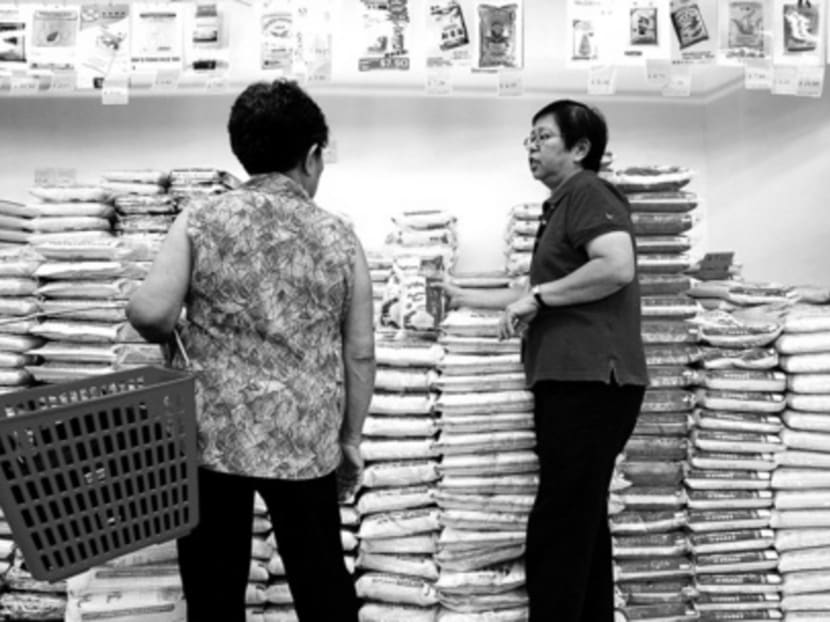Promoting social connections at supermarkets
At this month’s opening of the Enabling Village — Singapore’s first community space for people with disabilities — Prime Minister Lee Hsien Loong called on Singaporeans to continue building a more inclusive society by valuing everyone, and through active citizenship.

Interaction between supermarket staff and senior consumers can help forge community ties. TODAY file photo
At this month’s opening of the Enabling Village — Singapore’s first community space for people with disabilities — Prime Minister Lee Hsien Loong called on Singaporeans to continue building a more inclusive society by valuing everyone, and through active citizenship.
This is a timely call, as is the establishment of the Enabling Village, which not only houses organisations and government agencies serving people with disabilities, but also facilities such as a gymnasium, a kindergarten and a supermarket with universal design features such as lower check-out counters for those with mobility difficulties.
With an ageing population — the number of citizens aged 65 and above doubled from 220,000 in 2000 to 440,000 today, and is expected to increase to 900,000 by 2030 — it is important that the community provides more support to the elderly for Singapore to remain inclusive.
Indeed, amenities such as supermarkets can play a role in promoting social well-being, especially among seniors.
My interest in supermarkets and the well-being of seniors started with my discovery in Tokyo in 2010 of a unique local supermarket that provided support to ageing consumers in the neighbourhood.
Signs in the store had big font sizes and there was clear labelling at each aisle. Inside the lift were giant buttons and a hand rail. But what impressed me most went beyond the hardware.
For example, the supermarket had a free-of-charge social club for seniors that organised tea parties, day trips, health seminars, health checks, rental of nursing care equipment, and so on.
The store also offered free home-delivery services without a minimum purchase requirement for customers above the age of 70 (also to those who were pregnant or faced difficulties moving around).
There was one catch — seniors had to go personally to buy the product(s) and pay at the counter. This was a way to encourage seniors to get out of the house and remain active.
At the payment counter, the staff — usually older folk who have worked there for a long time — also provided social support to seniors by chatting with them and asking about their health. Recently, I learnt that the supermarket has started offering free shuttle bus services in the neighbourhood to facilitate visits to the supermarket.
DOING MORE FOR THE ELDERLY
Supermarkets situated in neighbourhoods are often natural nodes for people living nearby to congregate . Hence, it is a good fit to co-locate social activity centres or community centres with supermarkets.
In Singapore, some FairPrice supermarkets are located in community clubs. The government should encourage the expansion of such co-locations to promote inclusivity. For the retailers, it makes commercial sense too as seniors will increasingly make up a sizable portion of the consumer base here with an ageing population.
But we can do more. We need to rethink how — beyond selling merchandise — supermarkets can serve the seniors in a more comprehensive manner, from making space for notices and information for seniors (on topics such as healthcare, and healthy cooking and eating) to softer aspects that contribute to the social well-being of the older population.
Statistics released recently by the Ministry of Social and Family Development show that, besides an increasing proportion of households with at least one resident age 65 and above (from 21.1 per cent in 2000 to 29.6 per cent in 2014), we are also witnessing a shifting composition of these households.
One–generation aged resident households without children are increasing in proportion (from 9.2 per cent in 2000 to 17.7 per cent in 2014), and one-person aged resident households is on the rise (from 7.5 per cent in 2000 to 12.9 per cent in 2014). Although these figures are moderate when compared with other advanced Asian countries such as Japan, they point to the need for more measures to support seniors living alone and in mono-generation households.
A recent study by a group of students at the College of Alice and Peter Tan in the National University of Singapore found that interactions between supermarket staff and senior consumers can help forge community ties and give the elderly a sense of care and concern. Such social support is especially important for seniors who live alone.
This is why in September, the Centre For Seniors together with NTUC LearningHub, started training 100 supermarket frontline staff to better serve senior customers, especially those with symptoms of dementia who need more support.
Staff were taught to recognise symptoms of dementia, have patience and respect for seniors customers, including how to speak slower, maintain eye contact, bring them to the shelf when enquired about a certain merchandise and ways to handle incidents such as a fall.
There is still a long way to go before we turn the ubiquitous neighbourhood supermarket into an effective node of social support for seniors living in the community. If you are working in a supermarket or a retail stall, perhaps you can start by asking seniors with a smile: “How are you today?”
ABOUT THE AUTHOR:
Dr Thang Leng Leng, who sits on the Board of Directors of Centre For Seniors, is a social-cultural anthropologist with an interest in aging issues, among others. She is Associate Professor and the Head of Department of Japanese Studies and Deputy Director of Centre for Family and Population Research at the National University of Singapore.









